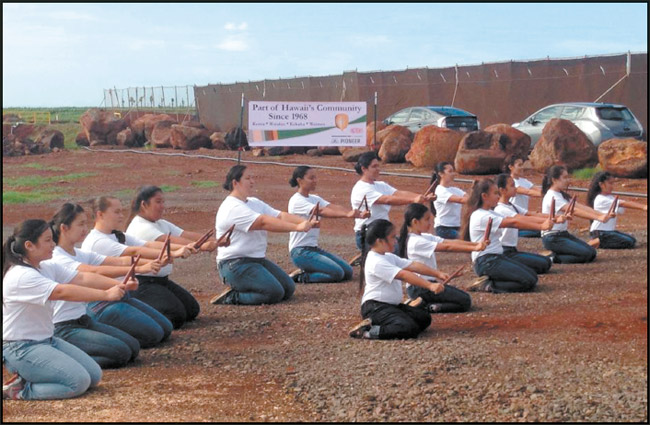New Kunia Garden To Provide Plants For Kapolei-based Halau

Members of Halau ‘O Kaululaua’e perform at the Nov. 2 groundbreaking and blessing of Kunia Hawaiian Cultural Garden with a hula about water and the vibrant life cycle of our natural resources. Once it begins to flourish, the one-acre garden on DuPont Pioneer land will provide native and traditional plant materials for lei making and cultural activities for the halau and Malama Learning Center at Kapolei High School. Photo courtesy of DuPont Pioneer.
A one-acre garden has begun to grow on DuPont Pioneer land in Kunia, where a partnership will enable Kapolei students and a halau to learn about and harvest native plants.
A blessing and ground-breaking were held Nov. 2 to create the unique outdoor classroom.
Participating were Malama Learning Center students from Kapolei High School, the Kapolei-based Halau ‘O Kaululaua’e and DuPont officials.
“This garden will enable us to engage our young people in hands-on approaches to learn about conservation and their culture, promoting sustainable living to the next generation,” said MLC director Pauline Sato, with a nod of gratitude to the multinational seed corporation at its Kunia Research Center. “In times like this when there are strong and conflicting opinions on different forms of agriculture,” she added, “we don’t take sides but rather want to work together on a positive project that serves a community need.”
The garden is designed to cultivate about 600 plants of 20 different species, the kind that are useful to hula troupes and to native Hawaiian cultural practitioners.
Malama Learning Center will grow the plants, and the halau will replant and care for them in the Kunia garden before harvesting them for performances.
“These materials have become difficult to find and can be quite expensive to purchase, creating a heavy burden for our hula families,” said kumu hula Miki’ala Kanekoa. “These … will be easily accessible materials in a safe environment for our young dancers.”
As site manager for the research station property, Mark Stoutemyer said he’s pleased to make this contribution, and the company hopes to replicate this garden at its other properties, “once proven successful.”





